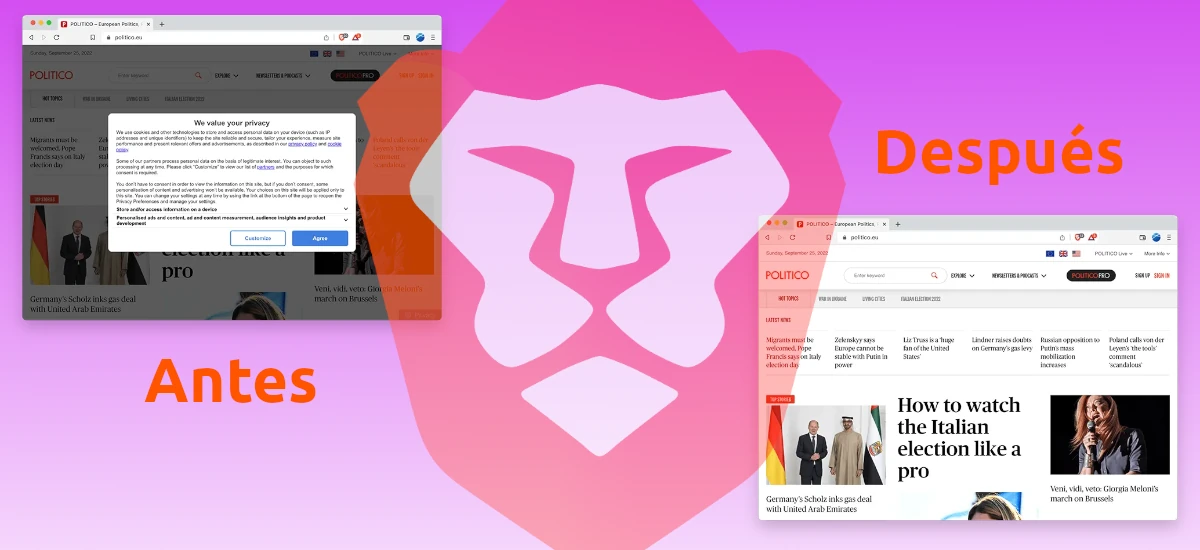
Let's see if this sounds familiar to you: you open a browser, especially after its installation, you go to, for example, Google or YouTube and... there it is, an almost full-screen warning (at least on mobile phones) that doesn't allow you to do anything if you do not accept or manage cookies. It is clear that this behavior was born with good intentions, that web pages did not abuse the use of cookies, but now it is more of a nuisance than anything else. Y Brave aims to put an end to them if we use this Chromium-based browser.
So the public this week in an article available on his website. As of Brave 1.45, the browser will block these consent notices on the desktop and Android browser, and later on the iOS/iPadOS browser. It will do so because they are a nuisance, and in most cases you shouldn't need to see that prompt. For example, if I create a performance cookie, which causes a web page to load certain animations the first time it is visited, but I want the animations to disappear the second time so that everything runs more smoothly, what does the visitor gain by seeing the warning? Just an annoyance.
In theory, Brave will do better than other systems
The modern browsers are already responsible for blocking these cookies by which the European Union requires that the notices be displayed. Therefore, there are plenty. Also, if on any website they wanted to make malicious use of a cookie, we are so tired of seeing these notices that they could inform us of such use and we would accept it without reading.
So says Brave Software: «What is ironic is that many cookie consent systems follow users, introducing exactly the damage the consent systems were meant to prevent.«. Not only could we consent to the malicious use of cookies, due to fatigue, but they take advantage of these notices to follow us. So the new versions of Brave will hide, and when possible they will completely block, these notifications. And the best, they will do it by improving the automatic consent systems used by other browsers or in famous I do not care about cookies.
How will this blocker work?
When you start the browser, we will be asked if we want to block the notices of cookies (YES!). If you choose to turn the feature on, Brave will download rules designed to block and hide consent prompts, and apply them as soon as possible (although they don't mention it, I do say it's worth restarting your browser to make sure). It can be activated or deactivated from brave://setings/shields/filters, from EasyList-Cookie.
Brave Software says there is various ways to block these benners, and that their proposal maximizes privacy while still blocking as many banners and annoyances as possible. The one used by Brave is described as:
One approach (which Brave uses) is to block cookie banners, and hide and tweak pages to remove any additional annoyances these systems include (such as overlays, preventing scrolling, etc.). Other web privacy tools (such as uBlock Origin) can be configured to use this same approach. This approach provides the highest privacy guarantees: it doesn't require you to trust cookie consent systems to honor your choice, and it prevents your browser from having to communicate with consent tracking systems at all.
The alternative works in a different way: it tries to automatically click the option that harms us the least, but that option is sometimes accepting everything. In this way, a profile with our preferences is saved, and this, according to the company, will not be the case when using Brave.
Manifest v3 could be a problem
Google will make changes that will affect the use of the web, and these will arrive together with Manifesto v3. It's so controversial that he had to delay repeatedly. So when the time comes, this protection could be affected as well.
In any case, the immediate future will take place this october, and Brave 1.45 will make it more comfortable to navigate. Let the rest take note.
This article opened my eyes and made me search how to block these annoying “ads”. And it turns out that ublock origins has the ability to do that too. To do this they must go to the configuration panel, filter list and expand the menu that says "Annoying Elements" and select "AdGuard Annoyances"
Thanks, I hope it works because the truth is that it's a pain in the ass.
Thank you very much for the tip
Why don't you just block his continuous cryptocurrency messages... they are even more annoying...
On the home page, on the bottom right, you have a drop-down where you can deactivate sponsored images and cards (the latter being cryptocurrency messages).
Greetings.
It is the only browser that replicates blocking in web applications through separate window shortcuts or with WebApp Manager. The rest of the browsers do not have extensions or in the case of Firefox that does not even allow you to create shortcuts. I can have Youtbe in a separate window as a web application and view without interruption.
Greetings.